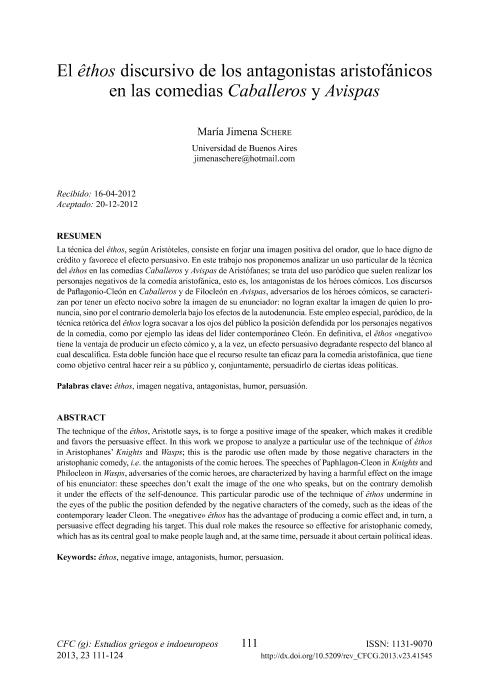Mostrar el registro sencillo del ítem
dc.contributor.author
Schere, María Jimena

dc.date.available
2017-10-09T19:05:15Z
dc.date.issued
2013-04
dc.identifier.citation
Schere, María Jimena; El êthos discursivo de los antagonistas aristofánicos en las comedias Caballeros y Avispas; Universidad Complutense de Madrid; Cuadernos de Filología Clásica. Estudios griegos e indoeuropeos; 23; 4-2013; 111-124
dc.identifier.issn
1131-9070
dc.identifier.uri
http://hdl.handle.net/11336/26251
dc.description.abstract
La técnica del êthos, según Aristóteles, consiste en forjar una imagen positiva del orador, que lo hace digno de crédito y favorece el efecto persuasivo. En este trabajo nos proponemos analizar un uso particular de la técnica del êthos en las comedias Caballeros y Avispas de Aristófanes; se trata del uso paródico que suelen realizar los personajes negativos de la comedia aristofánica, esto es, los antagonistas de los héroes cómicos. Los discursos de Paflagonio‐Cleón en Caballeros y de Filocleón en Avispas, adversarios de los héroes cómicos, se caracterizan por tener un efecto nocivo sobre la imagen de su enunciador: no logran exaltar la imagen de quien lo pronuncia, sino por el contrario demolerla bajo los efectos de la autodenuncia. Este empleo especial, paródico, de la técnica retórica del êthos logra socavar a los ojos del público la posición defendida por los personajes negativos de la comedia, como por ejemplo las ideas del líder contemporáneo Cleón. En definitiva, el êthos “negativo” tiene la ventaja de producir un efecto cómico y, a la vez, un efecto persuasivo degradante respecto del blanco al cual descalifica. Esta doble función hace que el recurso resulte tan eficaz para la comedia aristofánica, que tiene como objetivo central hacer reír a su público y, conjuntamente, persuadirlo de ciertas ideas políticas.
dc.description.abstract
The technique of the êthos, Aristotle says, is to forge a positive image of the speaker, which makes it credible and favors the persuasive effect. In this work we propose to analyze a particular use of the technique of êthos in Aristophanes’ Knights and Wasps; this is the parodic use often made by those negative characters in the aristophanic comedy, i.e. the antagonists of the comic heroes. The speeches of Paphlagon‐Cleon in Knights and Philocleon in Wasps, adversaries of the comic heroes, are characterized by having a harmful effect on the image of his enunciator: these speeches don’t exalt the image of the one who speaks, but on the contrary demolish it under the effects of the self‐denounce. This particular parodic use of the technique of êthos undermine in the eyes of the public the position defended by the negative characters of the comedy, such as the ideas of the contemporary leader Cleon. The ʺnegativeʺ êthos has the advantage of producing a comic effect and, in turn, a persuasive effect degrading his target. This dual role makes the resource so effective for aristophanic comedy, which has as its central goal to make people laugh and, at the same time, persuade it about certain political ideas.
dc.format
application/pdf
dc.language.iso
spa
dc.publisher
Universidad Complutense de Madrid

dc.rights
info:eu-repo/semantics/openAccess
dc.rights.uri
https://creativecommons.org/licenses/by/2.5/ar/
dc.subject
Êthos
dc.subject
Antagonistas
dc.subject
Humor
dc.subject
Persuasión
dc.subject
Imagen Negativa
dc.subject.classification
Lingüística

dc.subject.classification
Lengua y Literatura

dc.subject.classification
HUMANIDADES

dc.title
El êthos discursivo de los antagonistas aristofánicos en las comedias Caballeros y Avispas
dc.title
The discoursive êthos of the aristophanic antagonists in Aristophanes’ Knights and Wasps
dc.type
info:eu-repo/semantics/article
dc.type
info:ar-repo/semantics/artículo
dc.type
info:eu-repo/semantics/publishedVersion
dc.date.updated
2017-10-06T20:26:00Z
dc.identifier.eissn
1988-2637
dc.journal.volume
23
dc.journal.pagination
111-124
dc.journal.pais
España

dc.journal.ciudad
Madrid
dc.description.fil
Fil: Schere, María Jimena. Consejo Nacional de Investigaciones Científicas y Técnicas; Argentina. Universidad de Buenos Aires; Argentina
dc.journal.title
Cuadernos de Filología Clásica. Estudios griegos e indoeuropeos
dc.relation.alternativeid
info:eu-repo/semantics/altIdentifier/url/http://revistas.ucm.es/index.php/CFCG/article/view/41545
dc.relation.alternativeid
info:eu-repo/semantics/altIdentifier/doi/http://dx.doi.org/10.5209/rev_CFCG.2013.v23.41545
Archivos asociados
